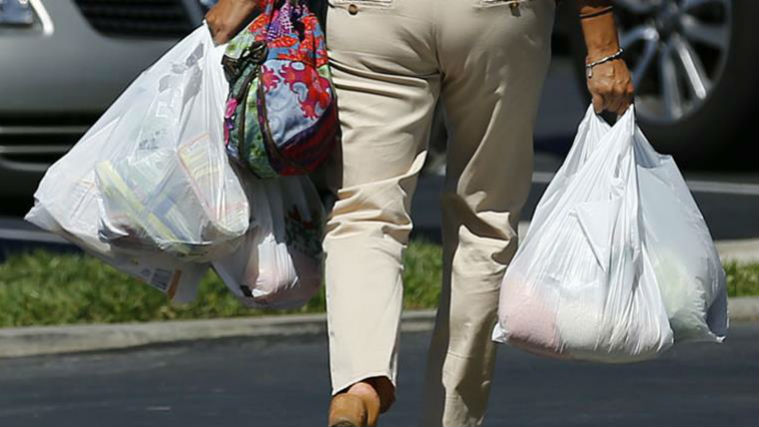Stay updated with the latest - Click here to follow us on Instagram
Hours ahead of plastic ban, no clarity on implementation, collection of fines
According to the Maharashtra environment department, apart from plastic carry bags, single-use plastics such as plates, cups, glasses, spoons, straws, cutlery, plastic pouches, non-woven polypropylene bags, etc will be banned.
 To encourage reuse and recycling of plastic, the government has come out with a depositary scheme involving a refundable against recycling. (Image used for representational purpose)
To encourage reuse and recycling of plastic, the government has come out with a depositary scheme involving a refundable against recycling. (Image used for representational purpose)
Even as the state government announced a ban on all plastic carry bags irrespective of thickness and on other single-use plastics effective from Sunday onwards, the government conceded that it is yet to prepare a mechanism for its implementation and collection of fines. A notification on the implementation is yet to be issued, two days ahead of the proposed implementation. According to the state environment department, apart from plastic carry bags, single-use plastics such as plates, cups, glasses, spoons, straws, cutlery, plastic pouches, non-woven polypropylene bags, etc will be banned.
However, plastic items exempted from the ban include plastic covers used for medicine and plastic bags or sheets used for handling solid waste, or that had agriculture and forest uses. Besides, mandatory plastic covers required for production at the production units, plastic bags for export in special economic zones will be exempted. To encourage reuse and recycling of plastic, the government has come out with a depositary scheme involving a refundable against recycling. For example, a minimum 50 paise will be collected from the consumer while purchasing a milk pouch and it will be refundable to the consumer if he returns the pouch to the retailer. For the plastic water bottles (PET bottles), a minimum Re 1 will be collected from the consumer while purchasing and will be returned to him when he returns the bottle.
“These additional deposit amounts will have to be published on the pouch or bottle. We are also taking Re 1 from the manufacturers to ensure they collect the water bottles and recycle them. Then we will refund them,” said Ramdas Kadam, Minister for Environment, adding that the directorate of Goods and Services Tax would recover the amount from manufacturers. Kadam further said that plastic bottle manufacturers have to set up recycling units at prime locations within three months of the notification. “The ban will come into effect from Sunday across the state. So far, many laws were made but they were not implemented effectively. Now, we have given powers to local level officials,” he said adding that if the deposit scheme for milk pouches does not work, the pouches will be banned after three months.
“A high power committee under my chairmanship will decide on mechanism to collect fines and any complaints against collection of fines,” said Kadam. Aaditya Thackeray, Yuva Sena president, said a meeting would be held soon with plastic manufacturers, hotels and restaurant associations to seek their cooperation. The state government has also proposed a fine of Rs 5,000 for the first offence, from consumers and producers, for violating the ban. For the second and third offence, the fine will be Rs 10,000 and Rs 25,000 respectively.
However, sources in the government said the plastic ban would come into effect only after a notification is issued by the government. “The high power committee set up under the chairmanship of the environment minister will work out the modalities of the notification and then it will be issued. It is likely to be issued by month end and then the ban will come into effect,” said a senior official, who did not wish to be named.
The official further explained that the notification would have details of the mechanism for implementation including collecting fines for violating the ban and details on the deposit scheme. “The environment minister wanted to keep his promise of banning the plastic from March 18, as announced earlier,” said another senior official.
Meanwhile, the state government has decided to designate officials from the shops and establishments and license departments, sanitary and health inspector, ward officials and other officials nominated by municipal commissioners for the implementation of the ban in municipal areas. For rural areas, police patils, talathi, gram sevak, block development officer, teshildar, chief executive officer of Zilla Parishad and officials nominated by district collector will implement the ban. Besides, the officials from the MPCB, Public Health Department, Sales Tax officers and few others departments will also nominate officials for implementation of ban.
Mixed reaction to plastic ban
With the state government announcing its plastic ban to be implemented from Sunday, there were mixed reactions in the city. While several residents welcomed the decision, they emphasized the need to create more awareness for effective implementation.
Daphne Warapen, an activist from Khar (West), welcomed the plastic ban but said the depository scheme is ridiculous and it would not work. “It is a ridiculous idea of collecting Rs 1 or 50 paise as deposit. Nobody will care to take it back and it will not work,” said Daphne, adding that the government must provide a collection point for collecting the existing plastic bags. “The ban seems to be ambiguous when it comes to implementation. How will authorities locate who has dumped plastic bags or bottles? Will the authorities fine the international passengers coming from airports with plastic bags or material?” Daphne asked.
Anil Joseph, chairman of Perry Road Residents Association in Bandra (West), said large scale awareness programmes are required. “It is a welcome decision but it will be very unfair to impose ban without large scale awareness campaigns. Many ALMs or residents association in our area are not aware of it. At least one month of rigorous advertising should be carried out in all mediums for creating awareness. Otherwise, people will come on street to protest against the ban,” he said.
Sudeep Naik, a resident of Girgaum, supported the stringent measures such as fines and the depositary scheme. “Without stronger norms, it will not be implemented effectively. There will be some opposition to it in the beginning but it is required for the long run. It is the responsibility of every citizens to not use plastic,” said Naik.







